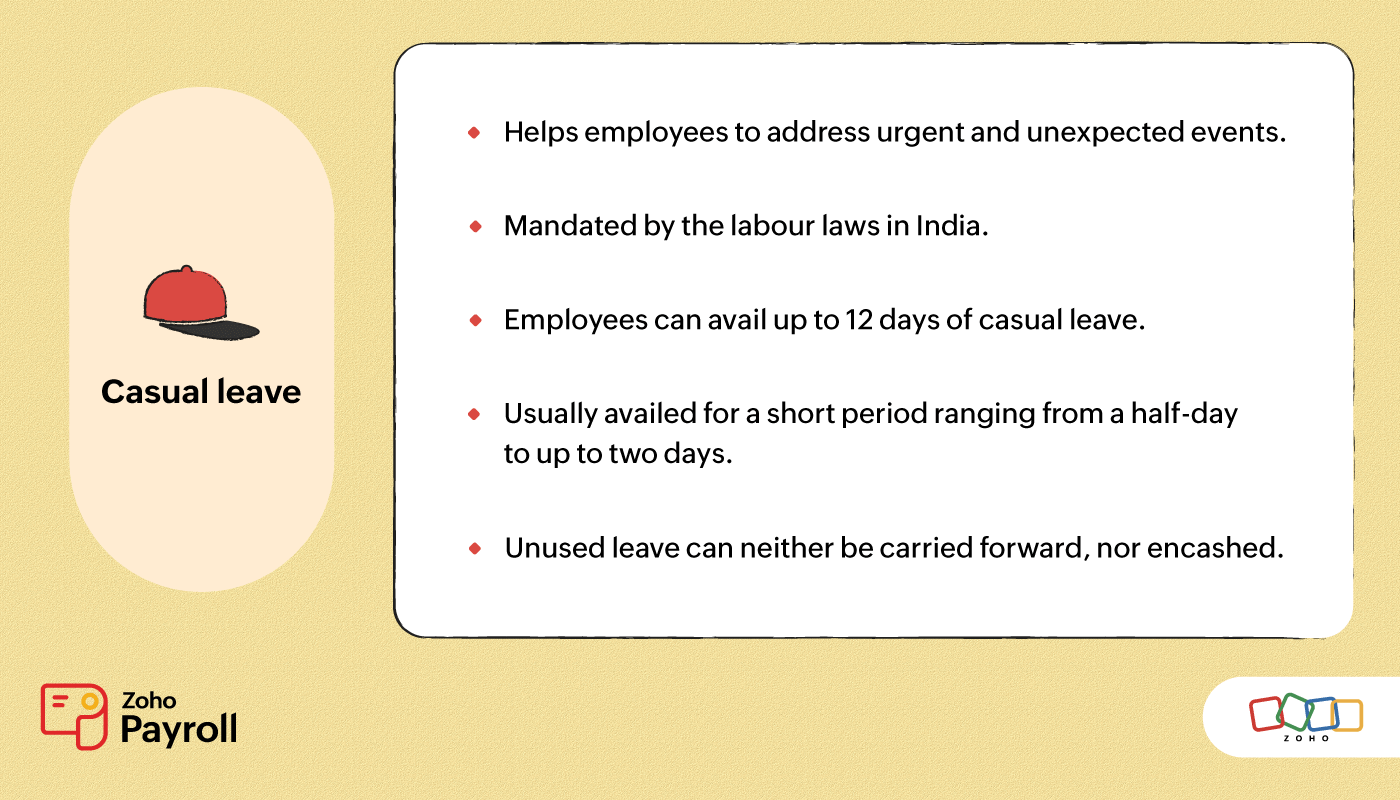- HOME
- HR and payroll
- What is a casual leave? Its meaning, duration, and rules
What is a casual leave? Its meaning, duration, and rules
The labour laws in India mandate that employees are entitled to certain types of leave in a year. One such leave is casual leave, a paid time-off that employees can take for personal or unforeseen circumstances.
Understanding the casual leave rules and crafting a suitable leave policy helps you in creating a supportive work environment for your employees.

CL leave full form and meaning
CL stands for casual leave. It is a type of leave provided to employees to address short-term, urgent personal needs, such as family emergencies or other personal matters.
It is generally taken for brief periods, ranging from half a day to a few days. Casual leave requests are approved on short notice, allowing employees the flexibility to manage personal situations without losing pay or using other leave types.
Casual leave reasons
Employees avail casual leave for various reasons, such as: Personal emergencies, like a family member's illness, or urgent household issues, like fixing electricity problems, or for simply running errands.
Casual leave rules
All companies registered under the Shops and Establishments Act must provide 12 days of casual leave annually. However, the specific rules to avail them can vary across organizations.
Is casual leave paid?
Yes, casual leave is paid. As per the labour laws, employees are entitled to receive their full salary for the days they take casual leave.
How many casual leave can be availed in a year?
Typically, companies provide 12 to 14 days of casual leave per year, depending on the industry standards and the employees' role in the company. Employers must clearly communicate the exact number of casual leave days available to employees on their job offer letter or at the beginning of the year.
How many casual leave can be taken at a time?
The duration of casual leave may vary, ranging from a few hours to a couple of days. While there is no strict rule, most companies allow a maximum of 2-3 consecutive days of casual leave. This limitation ensures that the leave is used for its intended purpose—short-term, unexpected needs—without affecting the business operations.

Casual leave policy
Developing a clear and comprehensive casual leave policy is crucial for ensuring smooth operations. Here's what to include in your policy.
- Eligibility: Specify who is eligible for casual leave. For example, mention whether employees on probation or those serving their notice period are eligible for casual leave.
- Approval process: Detail how employees should apply for casual leave, who approves these leave, and the timeframe for approval.
- Carry forward and encashment rules: Mention whether unused casual leave can be carried forward to the next year or encashed. Most companies in India elapse unused casual leave and do not consider them for leave encashment.
Difference between casual leave and earned leave
Casual leave and earned leave are both mandatory leave offered to employees in India, however their purpose, duration, and usage rules vary.
| Casual leave | Earned leave | |
| Purpose | For short-term and unexpected events. | For planned vacations or long-term needs. |
| Number of days per year | 12 to 14 days | 12 to 20 days |
| Duration | Usually limited to up to two days at a time. | Can be taken for longer periods. |
| Unused leave | Elapsed at the end of the calendar year. | Can be carried forward to the next year or encashed at the end of the year, depending on the company policy. |
| Accrual | Does not accumulate over the years. | Accrues based on the number of days worked. |
Frequently asked questions
1. What is a casual leave?
Casual leave or unplanned leave is a paid leave offered to employees for short-term and urgent reasons, such as personal errands, medical appointments, or family emergencies.
2. What happens if an employee runs out of casual leave?
If an employee exhausts their casual leave balance, they may need to use their earned leave or take LOP leave, subject to the employer's approval.
3. Can casual leave be carried forward to the next year?
Generally, casual leave cannot be carried forward to the next year. It must be used within the year it is granted.
4. Can casual leave be denied?
Yes, casual leave can be denied if it does not comply with the company policy or if the timing impacts business operations. It is up to the employer's discretion to approve or deny an employee's leave request.




